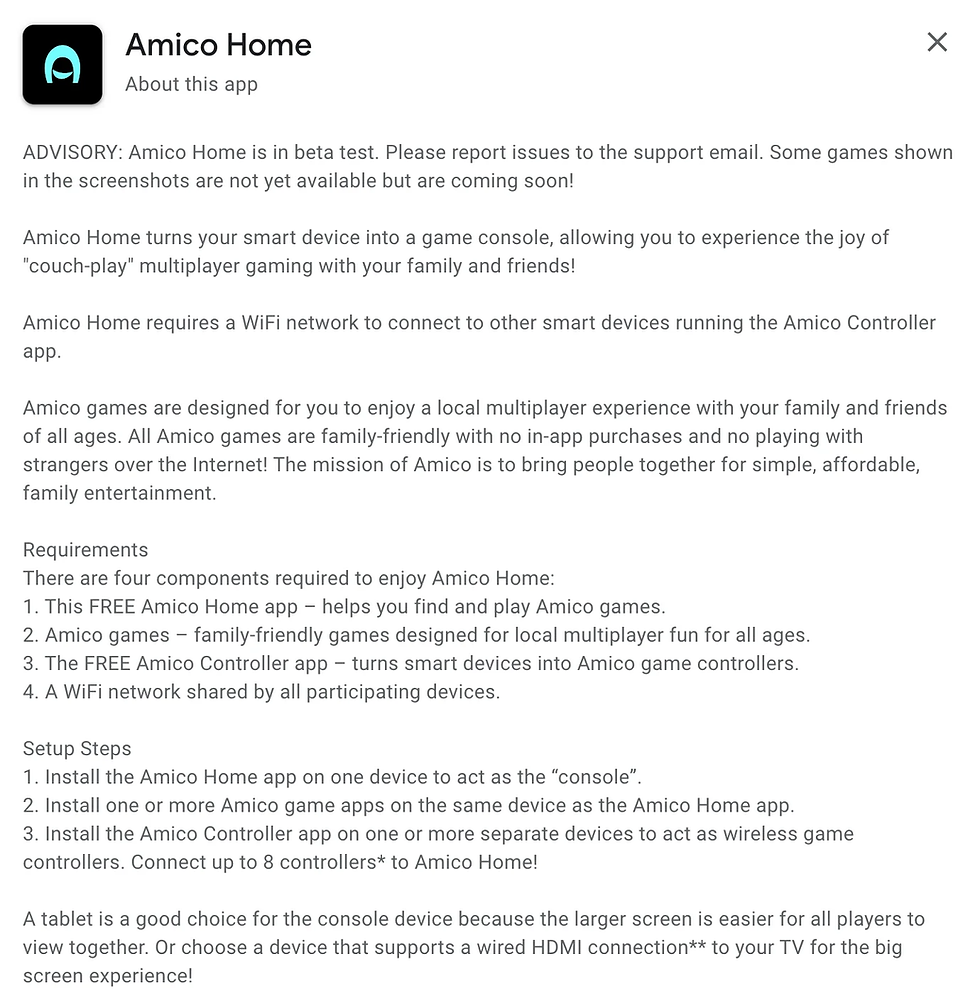The mobile app "Amico Home," recently launched on the Google Play Store, stands as a stark example of a misguided venture in the realm of user experience. Originally promised for a Halloween early access launch, the app's debut was delayed by nearly a month, setting the stage for the usual inevitable disappointment. Developed by Intellivision, the app falls far short of even modest expectations, particularly considering the already low bar set by Intellivision Entertainment's recent outputs.
Intended as a stopgap for those who had invested in the ill-fated Intellivision Amico console, "Amico Home" is a digital consolation, born from a series of delays and failed promises. The concept, a mobile extension of the console experience, was meant to pacify those who pre-ordered the console, encouraging them to hold onto their orders rather than seeking refunds.
The app is tagged as a beta version, a label that Intellivision has overused (and continues to use) as a shield against criticism for several years. This approach has often been coupled with selective information dissemination to a group of loyal influencers, while the company's leadership has engaged in damage control whenever their projects received negative feedback.
The most recent release, "Amico Home," is an attempt to replicate a console-like experience through a mobile application. This app requires users to assemble a complex ecosystem comprising the main app, individual game apps, a yet-to-be-seen controller app, and a shared WiFi network. This setup is not only UNBELIEVABLY convoluted, but also lacks the seamless functionality of mainstream gaming consoles like the Nintendo Switch (or literally anything else).
The Intellivision Amico Home's current state raises significant questions about its rushed release, suggesting a possible scramble to avoid legal complications or to fulfill certain contractual obligations. The app's poor functionality, characterized by glaring technical issues and an almost unusable interface, gives the impression of a product far from ready for public deployment. This hasty release, lacking in basic operational features, points towards a potential urgency to make the app available, regardless of its readiness. The situation leads to speculation that the decision to release the app in such an underdeveloped state might have been driven more by legal or corporate pressures than by a commitment to quality or consumer satisfaction. Such a scenario paints a concerning picture of the priorities and decision-making processes behind the app's launch, leaving users and observers puzzled about the rationale behind releasing a product so evidently unprepared for public use.
Retrobro, a YouTuber known for his insights into the retro gaming world, recently uploaded a video featuring a walkthrough of the Amico Home app. His experience, as shared in the video, highlighted the surprisingly limited functionality of the app. Viewers were amused to see that the app, despite being released publicly, was fraught with limitations, including a glaring issue where Retrobro was unable to click on or even purchase games. This walkthrough served as a stark revelation of the app's underdevelopment and lack of readiness for public use, drawing a mixture of laughter and disappointment from the gaming community. Retrobro's candid showcase and commentary on these deficiencies provided a clear and somewhat humorous glimpse into the current state of the Amico Home app.
The app itself is merely a portal to access purchased games and to be quite honest, seems somewhat insecure in its current state. Its complexity and potential security issues make it an unattractive option, especially considering the stringent requirements of platforms like the iOS app store... Guess that explains why they went the route of Google Play lol.
Despite claims of supporting up to eight players (they don't - yet - max players right now seems to be 4), the app's functionality and appeal are limited (as usual), with available games on the platform already accessible on other, more established platforms like Switch, Steam, and Xbox.
The app's release, coupled with the company's history of missteps, raises questions about its intentions and future. With significant funds already spent and two of its games handed off to another developer in BBG Entertainment, Intellivision's efforts in the mobile app space seem like a desperate bid to maintain a facade of activity. This effort, however, appears more like a last-ditch attempt to stave off legal or financial repercussions rather than a genuine attempt at innovation or customer satisfaction.
Intellivision "Amico Home" is a testament to a series of misjudgments and mismanagement, likely to be remembered more for its failures than any significant contribution to the gaming world. The app's future remains uncertain, but its current state offers little hope for redemption or success.








Comentarios